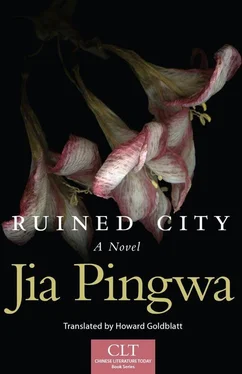“He really does possess qi,” Xia Jie said. “Last night I woke up feeling bloated, so he used qigong on me. The next thing I knew, my stomach was rumbling, and I had to run to the toilet. He has stopped eating meat, doesn’t drink alcohol, has quit smoking, and won’t touch a leek.”
“That’s true,” Meng confirmed.
His friends laughed. “So you turned into a monk by following one. What about sex? If you’ve stopped sleeping with your wife, then you have truly become a monk!”
Xia Jie laughed with them. “I’m waiting for his abstinence myself,” she said as she looked at him out of the corner of her eye. He blushed.
Only Xia Jie and Meng Yunfang knew what she was referring to. During the time he was practicing qigong, Meng had met a nun from the temple named Huiming. A young woman of twenty-four, she had come to the Yunhuang Temple after graduating from a Buddhist college three years earlier, and the two of them had spoken on several occasions. Meng admired her for her extensive knowledge of Buddhism, and had read The Compendium of Five Lamps and the Diamond Sutra , upon which he was happy to expound. Huiming often went to see him when she encountered things she did not understand. As a result, she frequently showed up on her side of the wall around noontime and called out for Meng Yunfang, after which they engaged in long conversations. One moonlit night, Xia Jie came home to find Meng at the wall talking to Huiming; he had been standing there so long that mosquitoes were feasting on his exposed legs, and he was scratching one leg with the other foot, back and forth.
This side of the wall said, “Huiming, this essay is much better, but you need your rest.”
“I am not tired,” that side said. “Exhaustion comes from mental fatigue. I wrote this when it was quiet, and it made me happy.”
This side said, “Is this the happiness of Nirvana? We are separated only by a wall, but live in two separate worlds. I envy you so…”
That side giggled. “You can be anything you want, anything but a monk. You are out there looking for peace and quiet, but you cannot find it. If you ever do find a peaceful and quiet spot, I am afraid you will be disappointed.”
“Do you think so?” this side said.
“You cannot tell anyone what I said to you the other day,” that side said.
“I know,” this side said. “We are of one mind. My lips are sealed.”
That side said, “Meng Laoshi, you are a good man. I have written a petition that I would like you to take to the mayor’s office.”
This side reached over the wall. “Stand on a rock and hand it to me. Oh, no, have you twisted your ankle?”
“No,” that side said. Sheets of paper appeared atop the wall, which Meng grabbed, just as the board he was standing on snapped in two, sending him thudding to the ground. He banged his chin on a tile on the way down and sent it, too, crashing to the ground.
Xia Jie laughed as she watched the drama unfold in front of her. “Be a little more careful, Yunfang,” she said. “I’ve only seen the first act of Romance of the Western Chamber! ” Without looking to see if he was hurt, she carried a stool to the wall and gazed over it to the other side. The nun had already scurried away through the flowers, like an apparition.
That comment in front of all those people made Meng Yunfang blush. “Don’t say any more,” he cautioned her. “Buddhist affairs involve boundless beneficence.”
The onlookers, who by now were totally confused, changed the subject to lunch. “Good sister,” they said, “you supply the labor and we’ll supply the capital!” Each of them handed five yuan to Zhao Jingwu, who did not mind the trouble. He took his basket to buy food and drink.
. . .
Over a period of years, Tongguan County, four hundred li east of Xijing, had become home to idlers and ne’er-do-wells who complained about anything and everything, settling over society like a swarm of bottleneck flies. One of that crowd, a man named Zhou Min, looked on as those around him seeking government work made it onto the promotional ladder, and those looking to get rich were well along, with hundreds of thousands of yuan safely in the bank. He was still trying to find his way. As dusk settled in one afternoon, he was sitting around the house feeling bored. He tried to read but couldn’t, so he went to a coffeehouse to kill some time, and from there to a dance hall, where he met a beautiful young woman. It was the first of many nights he spent in the same place, and she never failed to show up. Then one night he entertained a wild thought: maybe, he thought, she’s the one for me. So, when the dance was over, he offered to see her home. She refused, but her refusal lacked conviction, which emboldened him. He gave her a ride to an out-of-the-way lane, and when she stepped down off the bicycle rack to say good-bye, she thanked him and said, “I’ll be okay now.” He stayed put, pulled her over, and kissed her. “I hate you!” she said tearfully.
“You excite me,” Zhou Min said in response. “I can’t help myself.”
“I hate that I’m meeting you only now. Where were you three years ago?”
Zhou Min picked her up, sat her back down on the bicycle rack, and pedaled to a riverbank outside of town, where they jumped off the bicycle and began pawing and groping.
“I’m married,” she said when they were finished. “I have a two-year-old child.”
That was unexpected, but Zhou would not be denied. “I don’t care, I want you. Marry me!”
Unable to get him out of her mind, the woman, whose name was Tang Wan’er, finally told her husband she wanted a divorce. He demonstrated his refusal by stripping her naked and beating her. When she did not show up at the dance hall that night, Zhou Min had a friend stake out her home, and when he heard what had happened, he waited till the husband left the house the next morning and took Wan’er someplace where the man would not find her. But Tongguan was so small that even the comings and goings of a fly, let alone a human being, did not go unnoticed. When Zhou Min went to see her on her fourth day in hiding, she told him she had spotted a friend of her husband’s skulking around the place, obviously sent to find her. Deciding that Tongguan was no place for them, he hired a taxi, and he and Wan’er left for Xijing, where they rented a house and moved in together.
The couple took to the city like fish to water. After acquiring some furniture and whatever else they would need to set up house, they took in the sights — Huaqing Hot Springs and the Giant Wild Goose Pagoda; they even visited the Xijing Garden Hotel and Heavenly Horse Amusement Park. Born to be a tourist, she was captivated by the hotel’s extravagant lobby and the beautiful clothing for sale. Wan’er was an avid reader, a woman with intriguing and unusual ideas about things. When they walked past the city’s media tower, a gigantic clock announced the hour with loud musical chimes. “If someone were in the mood to kill himself,” she said, “leaping from the clock tower would be a spectacular way to do it.”
“That’s not the way I’d do it,” Zhou Min said. “I would hang myself from the clock itself. That way I’d go out with music, and in full view of everyone in the city.”
Liking what she heard, Wan’er threw herself into his arms and told him that when she and her husband were arguing one time, she had played a serenade on the radio as a means of calming things down, but he had kicked the radio over.
“He’s ignorant,” Zhou Min said.
“He’s all muscle,” she said, “like a mule!”
Their passion cooled after a month or so, and their money was running out. To Zhou Min, this was what a man could expect from being with a woman. Wan’er was beautiful and glamorous, they were living in a big city, and yet none of this brought him the satisfaction he sought or helped him find what he was looking for. There were new movies to see, fashionable clothes to wear, and plenty of accessories to buy. What he lacked were new ways of thinking, fresh ideas. There were no changes in the morning sunlight scaling the city wall, the same flowers bloomed in the garden, and even though women now wielded more authority than their husbands did, they were still limited to one day — Women’s Day — on March 8th. An eighty-year-old man could be a bridegroom, but he was still an old man. Zhou Min, who was now mired in depression, could not reveal these thoughts to Wan’er, and was reduced to making his way to the city wall in the mornings and evenings to play his flute. But that did not solve the problem of finances, so he went looking for work, and found it at the neighborhood Clear Void Nunnery, where several side rooms were being renovated. Since the workers were paid daily, he was able to buy a fish and half a jin of fresh mushrooms each day to take home for her to make dinner.
Читать дальше


![Matthew Vincent - [you] Ruined It for Everyone!](/books/216429/matthew-vincent-you-ruined-it-for-everyone-thumb.webp)









